RSC expands scheme to give children skills through Shakespeare
- Published

Children from one primary school appeared in Romeo and Juliet at Blackpool Grand Theatre as part of the RSC programme
A scheme by the Royal Shakespeare Company (RSC) to partner with schools across England is being expanded to five new locations.
The company will work with pupils in Skegness, Coventry, Peterborough, Corby and Hartlepool to help them become more familiar with Shakespeare's work.
The RSC's Associate Schools Programme aims to target areas of structural disadvantage across England.
It has previously gone into areas such as Blackpool, Newquay and Hull.
These are some of the places where, traditionally, opportunity in culture and art is low; where educational attainment, employment opportunities, even transport infrastructure lags behind the national average.
There are currently 26 areas in the RSC programme, including North Staffordshire; and BBC News spoke to the head teacher of Springhead Primary School.
After one session of PE there, one nine-year-old girl is heard saying to her teacher: "I'm absolutely sluggardized."
A few weeks before, her year five class had been deciphering the word - meaning made lazy or idle - in one of Shakespeare's plays. Now she was using it correctly, to emphasise how exhausted she felt.
For her school, it was the latest example of how Shakespeare is transforming the lives of children, including pupils who often struggle with language.
"The children cheer when we say we're going to do some Shakespeare work," says head teacher Brian Anderson.
That presumably can't be said for most school kids.

A boy from a school in Blackpool, playing the role of a servant in Romeo and Juliet at Blackpool Grand in 2019
The RSC has seen a real-terms cut in its funding from Arts Council England, but ACE have awarded new specific funding for an increase in RSC touring, including to schools which is also backed by charitable grants and a loan from Nesta, a social innovation foundation.
Jacqui O'Hanlon, the RSC's director of learning and national partnership, explained: "The language development of a child by age five is still the greatest predictor of whether that child can escape poverty in later life."
The RSC programme is about introducing children to the richness of Shakespeare's language. She says they "get really curious about the possibilities of the meaning of particular words, rather than finding them scary or confusing".
"Time and again it's the children who have struggled with reading and writing who are absolutely captivated by these plays."

Actors bringing Twelfth Night to a school in Birmingham, as part of the RSC's First Encounters scheme
The programme reaches 135,000 children and young people each year. It also aims to show them the many job opportunities possible in theatre, both on stage and off.
At Springhead, it starts with three and four-year-olds.
The nursery children might be shown a picture of Julius Caesar and told he's just won a battle. They march around as soldiers and talk about how their characters could be feeling at that moment.
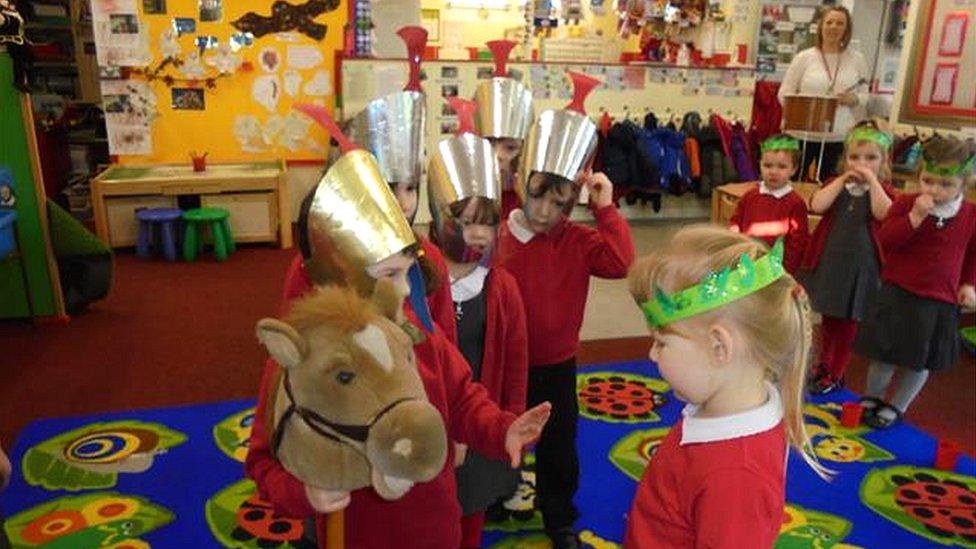
Children from Springhead Primary School acting out a scene from Julius Caesar, when he returns from battle
The teacher might introduce them to A Midsummer Night's Dream with different words on the floor that could describe a forest. The children talk about those words and begin to add their own.
It's all about getting them more confident with language. Every school year at Springhead is involved.
The RSC trains the teachers in techniques used by actors and directors in rehearsals. Instead of sitting down and reading a difficult play, they are acting, exploring characters and their language choices, and getting behind the words to find their meanings.
RSC actors also perform in the schools as well as at local theatres which are also involved in the programme.
Anderson says it has a direct impact on his children's language development and literacy.
"The quality of their writing has really developed. The children really get a feel for the world of the play. When they go into the classroom to do the writing, it's easier."
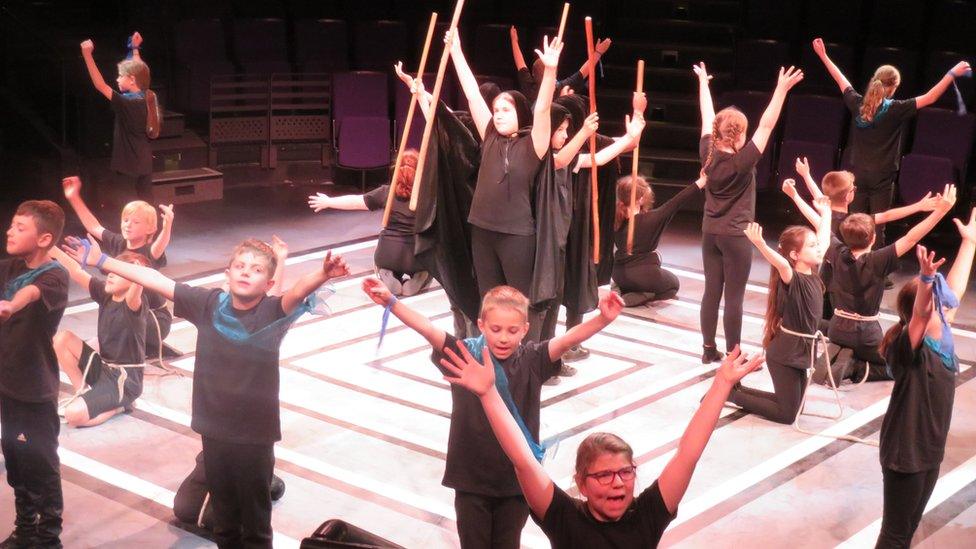
Children from Springhead Primary School perform an extract from The Tempest at the New Vic Theatre in Newcastle-under-Lyme
He tells me about a child with dyslexia who needed a teaching assistant to write his words down because he refused to put pen to paper.
In year six, the class was studying The Taming of Shrew, role playing and discussing why the characters might make those language choices.
The children were then asked to think of a line the character Katherina might say about her sister, Bianca, the favoured child.
The 10-year-old piped up: "She drops one tear and gets the world handed to her on a golden platter.
"The teacher said it was wonderful. The other children started asking him about his sentence and saying they wanted to use it. Self esteem and self belief came from that.
"He told the TA he didn't want her to scribe for him anymore. From that moment on, he wrote himself."
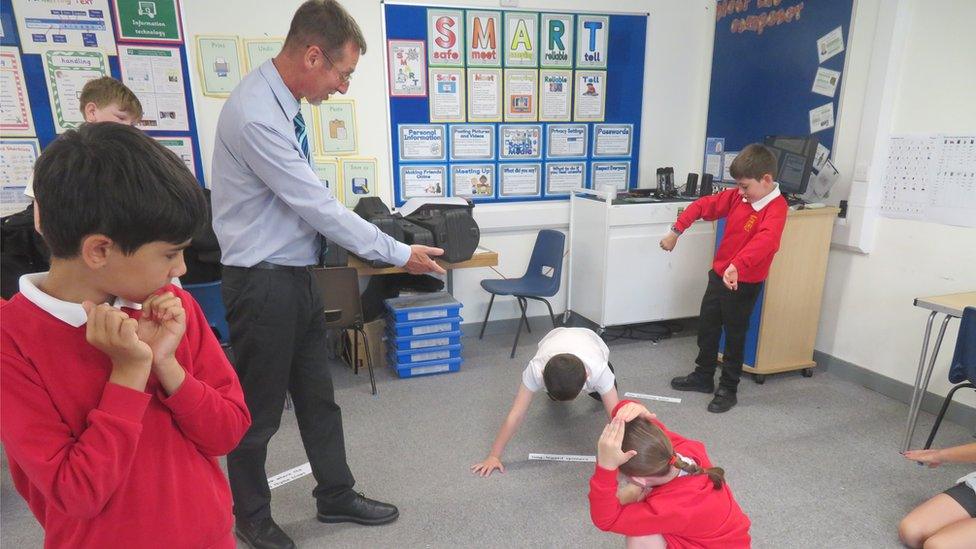
Springhead Primary School's head teacher Brian Anderson helps pupils create a "word carpet"
The RSC's aim is to accelerate language acquisition, raise aspiration and widen creativity and critical thinking. A study is under way to assess its impact but, according to O'Hanlon: "Teachers tell us that children who weren't previously meeting expected standards now consistently are - because of how they're taught Shakespeare."
Rona Pryme is the Executive Principal of Skegness Infant and Junior Academies, the schools leading the town's new partnership with the RSC which will start in September.
More than two thirds of her children claim free school meals - a marker of deprivation that is three times the national average.
Employment in this part of Lincolnshire can be seasonal and unreliable. Pryme told me many of her families are living in substandard housing and cramped conditions.
She wants to give her children something to aspire to.
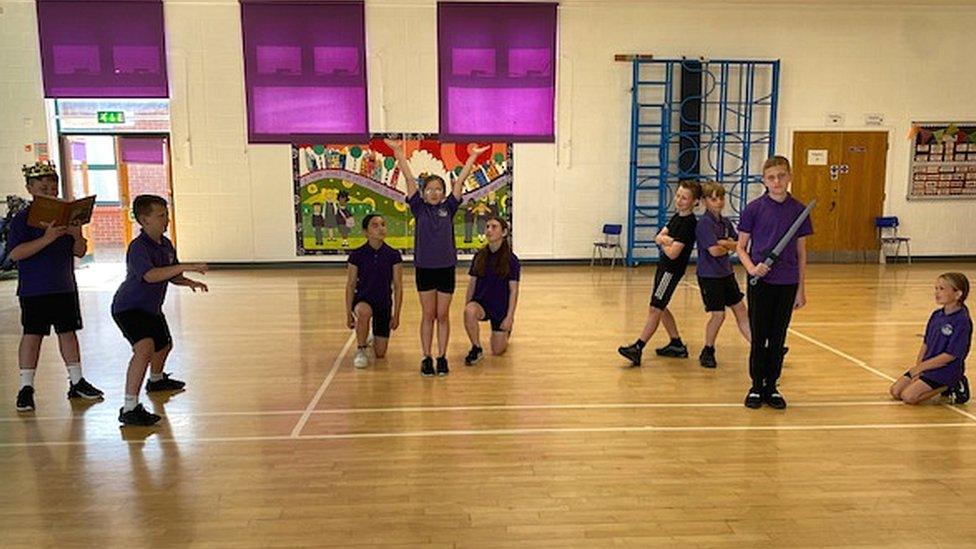
Children from Skegness Junior Academy taking part in a workshop based on A Midsummer's Night's Dream
As well as Shakespeare in school, they'll be performing at the town's Embassy Theatre.
"We don't think of Skegness as the centre of the cultural universe, but we have to challenge those ways of thinking."
"We're hoping that the children will have their eyes opened, that they'll see that there is an option for them to have a career in the arts.
"If it sparks one child to go into an alternative career, that's a good thing."
Back in North Staffordshire, 18-year-old Callum James would "100%" love to be an actor though, for now, with financial stability in mind, he is applying to the police force.
As a child at Springhead Primary in North Staffordshire, he was one of the first to take part in the RSC outreach programme around 10 years ago.
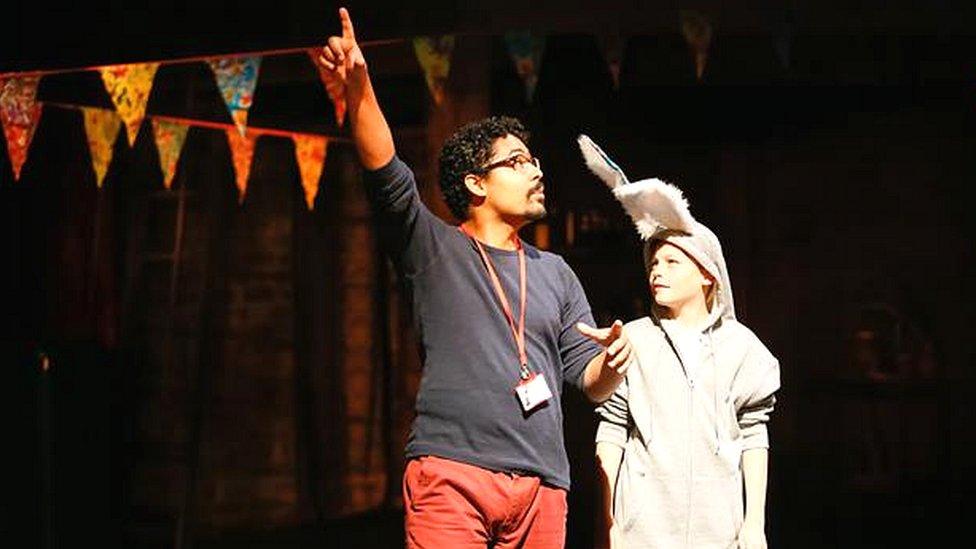
Callum James (here being directed by the RSC's Robin Belfield) says the RSC's programme gave him confidence
"I remember being very excited by it all. I didn't know who Shakespeare was but I enjoyed it from the get go, the weird and wonderful words he used, like 'thou' and 'art'".
Picked to perform at school and at the local New Vic theatre in Newcastle-under-Lyme, Callum was then chosen for the RSC's Next Generation talent development programme for kids from disadvantaged backgrounds.
He's since performed at the RSC's Swan Theatre in Stratford-upon-Avon.
Callum says he loves "delving into" Shakespearean language and that being involved with the RSC has built his confidence.
"It's a sense of achievement, being able to understand and appreciate his meaning. Shakespeare is for everyone. His plays were for working class people to enjoy. If actors got the lines wrong, they threw tomatoes at them."
O'Hanlon believes it is precisely the difficulty of Shakespeare's language that can be life-changing.
"It's all about giving the children the tools to decode things. They get a feeling of power. It's like unlocking a secret code. So they feel like they can do anything."
It can start small. Like the child after PE using an unusual word from Two Gentlemen of Verona.
It could be the beginning of something much bigger.
Related topics
- Published28 April 2018

- Published9 December 2010